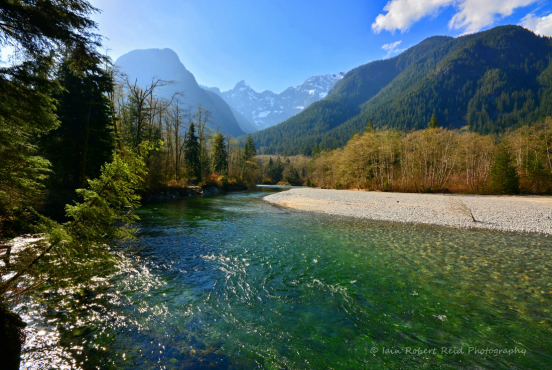If you’ve ever read William Cronon’s “The Trouble with Wilderness”, you’ve probably felt a progression of shock, confusion, denial, understanding, guilt, and finally embarrassment as you realized that yes, he’s talking about you… and me… and everyone who calls themselves an “Environmentalist”, particularly in the West. His argument, in short, is that “Wilderness” is a human construct – an idea that can only exist in the context of changing human attitudes and cultural narratives surrounding nature – and that it is this idea of preserving “Wilderness” that shapes the modern Environmentalism effort. According to Cronon, “Wilderness” does us more harm than good.
So what is the trouble with “Wilderness”? Basically, the trouble is that we Westerners tend to look at nature as opposite from civilization. Nature is where humans aren’t. If humanity is Capitalism, crowded cities, money, class struggles, and pollution, then nature is a place to escape all of that and go “back to our roots” (Frontier myth) or “find God” (the Sublime) or something of the like. Therefore we must protect nature from humans, right? Isn’t that how we’ll save the world? We can begin to see the irony here.
What about the millions of native people that have been displaced throughout the Americas, shoved onto reserves or rickety makeshift housing, in honor of creating “untouched” nature. This is called Fortress Conservation. Most places we think of as pristine probably had people living there at some point in forgotten history – but, oh no, let’s not talk about that. You see, the idea of “Wilderness” is mostly a reflection of bourgeois, urban, and male interests. It was Capitalists escaping Capitalism who funded the creation of protected National parks so that they could get away from the horrors of civilization and go hunting, fishing, camping, etc. The “Wilderness” of nature became a selling point, and nature a place you need a ticket to visit.
That’s part two of the problem: that “Wilderness” is a thing that exists only in nature, and we must escape humanity in order to find it. That means leaving our regular lives behind for a while – leaving our responsibilities, troubles, and bad habits at home as we go journey into nature to rediscover our “true selves”. If we are the ones causing the deterioration of nature through our extravagant lifestyle and industry, than how can it possibly help to forget about that as we vacation into the “Wilderness” which is already protected? How does it help to “save the trees” in our own backyard, when it means that more will be chopped down somewhere else, transported, and brought back to us to use?
Modern Environmentalism works a lot like Voluntourism if you ask me. We’re all guilty of the romanticized idea of going off to another country or a National park to save chimpanzees, or tag turtles, or replant trees in the middle of nowhere for a few months to feel as if we’ve done something for the earth. I’ll admit I often get these wild ideas. But we forget that by doing that, we’re only tackling the symptoms of the true problem. We forget to ask, why are the chimpanzees and the turtles in danger? Why are the trees dying?
The true problem lies in our lifestyle… in our industry, our pollution, and our sprawling urbanity which affects entire systems of nature, and causes those symptoms we are trying to fight. Cronon is arguing that we need to figure out how to live with nature ethically, sustainably, and honorably. We need to find ways of integrating wild things, such as animals and plants, into our cities and our lives such that Environmentalism is an everyday effort, and not just something we do once in a while. We need urban farms and rain gardens, and solar panels, and parks in our cities, and habitats for our animals. We need to reduce, reuse, and recycle. We need to create change from the inside out, so that everybody together is included in the effort and nobody is pushed to the side. We are all part of nature, and we could all do our part if only we stopped trying to preserve “Wilderness” and started to live it.




Maddy
February 8, 2021 — 9:31 am
This is now a very old article but thank you for writing it because damn did you help me understand this and I’ll actually do well in class now.
You’re a wonderful human.
David Schlesinger
February 24, 2021 — 3:08 pm
lol same i need this for class as well. let me get dat essay.
Jaiden
October 17, 2021 — 7:36 pm
This is such an amazing analysis of Cronon’s article! Thank you for breaking it down for us!
Madyson
February 23, 2022 — 11:29 pm
Another student that is grateful for your contribution to the internet. Thank you for this well put explanation of Cronon’s writing!
Vic
June 21, 2023 — 2:47 am
Yet another student here to thank you for this succinct summary.
Archit Mehta
October 14, 2023 — 2:09 am
Your blog post was a valuable resource on the topic. I liked how you incorporated real-life examples and case studies, which added credibility and practicality to the content. To explore more, click here.
Maxwell
November 12, 2024 — 10:45 pm
This is interesting. I was finding it difficult to comprehensive this article but you made it easy for me. Now I can write my reaction paper for my class tomorrow.
Krista
August 27, 2025 — 7:32 pm
Ditto thank you, I get it now!